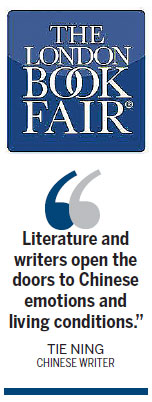Writing for hearts and minds
Updated: 2012-04-18 09:02
By Mei Jia (China Daily)
|
|||||||||||
The largest delegation of Chinese writers visiting the London Book Fair is hoping to win over British and worldwide audiences. Mei Jia reports in London.
 |
It's late afternoon on Monday, the first day of the London Book Fair, and writer Tie Ning is talking to a roomful of people in Earl's Court on the topic of female authors. "Some say women think with their wombs, whereas men use their brains," Tie says. "But the womb controls everything, including the brain." The audience - a mix of nationalities, men and women - bursts into peels of laughter. Tie is leading China's largest delegation of writers to the fair, to showcase contemporary Chinese literature. In addition to the cultural exchange events she is attending, Tie has also signed a contract with Blue Door to publish her signature novel, The Bathing Women.
Susie Nicklin, director of literature at the British Council, tells China Daily this is the first time they have hosted such a large group of Chinese writers in the UK.
In another first, the British Council has also invited other Chinese authors to tour the UK after the fair and take part in literary events, Nicklin adds.
"We're very excited about the additional opportunities to spread the word about Chinese literature," she says.
UK publishers are aware the general public has only a vague idea about contemporary Chinese literature, though they may know something about the country's classics.
Penguin China's Jo Lusby was responsible for publishing the best selling Chinese novel so far in the West, Wolf Totem by Jiang Rong. Now she is promoting Sheng Keyi and her new book Northern Girls to British readers.
"For Chinese writers, the physical and linguistic distance means it can be difficult for them to promote their books in the UK.
"But having them on platforms, both within the official programs and more widely in bookshops and event spaces around London, is a valuable opportunity to put them in front of their audiences," Lusby says.
"If readers have an opportunity to hear an author speak, we find they create a strong relationship with the book."
Tie agrees and adds that it's exciting to communicate with new audiences at international book fairs.
"Books are good, but if the creators of the books appear directly, each of them individually stands for China's people, which conveys more information," Tie says at the market focus reception, a day before the fair gets underway.
"Literature and writers open the doors to Chinese emotions and living conditions. The most complete works are about real-life situations and what the writer feels deeply about."
Tie says she was deeply inspired by Charles Dickens when young and values British literature.
She also says that though book fairs will advance the cause of Chinese literature, "Persistent writing with enthusiasm is the key."
Ou Ning is chief editor of the literary bi-monthly Chutzpah Magazine that runs an English supplement called Peregrine, featuring Chinese literature translated or written in English.
Ou hopes to blaze a new trail for Chinese literature and hopes a combination of literary festivals, awards, workshops and physical bookstores, will make it more global.
"We have lofty plans, but we know it takes time," he comments.
"Translation aside, the biggest challenge is that Western readers have become accustomed to limited aspects of China, usually its history, politics and the rise of its economy."
Ou adds that a dearth of high quality literary agents is also holding the country's literature back.
He cites the example of Yu Dan's book Confucius From the Heart, which is one of the most influential Chinese titles to be published in the West.
Behind Yu Dan's success story, there is Toby Eady, the translator who worked directly with Yu, and made use of his own contacts to create a market for the book.
In addition to the writers, agents and publishers, the Chinese government is also helping pave the way to greater market penetration in the world of books, since it understands literature is a key to winning hearts and minds.
The China Book International (CBI) project is run by the General Administration of Press and Publication, together with State Information Office - and works in a similar way to the British Council and Dutch Literature Foundation.
Started in 2006, CBI at first found it difficult to promote Chinese literature, but has gradually developed a more successful model.
"Offering translation fees and letting Chinese and foreign publishers plan and present books according to their own judgment and market orientation has proven to be more efficient," says CBI's office director Zhang Yanbin at the organization's annual meeting in Jiangxi, in late March.
CBI sponsored 240 joint projects in 2011 with 124 publishers from 29 countries, translating into more than 20 languages, leading to 3,236 titles.
This was an increase of 25 percent compared with 2010, Zhang says: "CBI has climbed new heights."
Related Stories
Senior CPC official starts visit to Britain 2012-04-17 17:25
Senior CPC official attends opening ceremony at London Book Fair 2012-04-17 17:13
Senior CPC official attends London Book Fair 2012-04-17 16:17
London Book Fair offers opportunity to 'read' China through books 2012-04-17 15:59
Today's Top News
Rescuers race against time for quake victims
Telecom workers restore links
Coal mine blast kills 18 in Jilin
Intl scholarship puts China on the map
More bird flu patients discharged
Gold loses sheen, but still a safe bet
US 'turns blind eye to human rights'
Telecom workers restore links
Hot Topics
Lunar probe , China growth forecasts, Emission rules get tougher, China seen through 'colored lens', International board,
Editor's Picks

|

|

|

|

|

|





